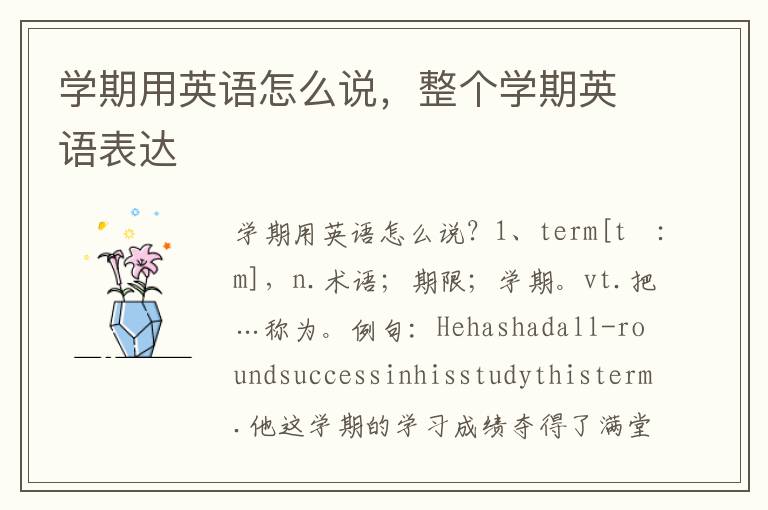【简介】感谢网友“雕龙文库”参与投稿,这里小编给大家分享一些,方便大家学习。
"Dr. Carr! Is it you? Is it really you?" I turned from where I had been browsing in the bookstore to see a six-foot-six, muscular, good-looking, smiling, sandy-haired young man calling me.
"It's me, Dr. Carr! Gibby!"
"Gibby, it can't be. You're all grown up!"
Looking closer, I would have known those eyes anywhere: serious, intense, penetrating blue eyes. Yes, It was my Gibby, all right.
He leaned down to hug his former elementary principal, and my thoughts went back to that shy, overweight little boy who transferred to our school as he began the fifth grade. He was quiet and withdrawn then.
Gibby had a difficult time the first few months, as do many children when they enter a new school. Some of the boys teased him about his lack of athletic ability when he attempted to play games on the playground. Gibby wasn't coordinated and had difficulty keeping up. He always appeared to be stumbling over his shoestrings. Most of the time, he was. I would remind him, "Better tie your shoestrings, Son," and he'd reply, "Yes, ma'am, Dr. Carr."
Often I would watch the students playing at recess. I noticed that when they began to choose up sides for a game, serious little Gibby would usually be left standing alone. Several times I went out on the playground and said, "I never get to choose a team. May I?" The boys and girls would laugh at their principal who wanted to play, and say, "Okay, Dr. Carr, it's your turn!" I'd call out a few names and then, around the fourth or fifth spot, I'd call Gibby's name and a few others who never seemed to get selected by their peers. My team may not have been the best, but we were, by far, the happiest and definitely the most committed, determined, and loyal.
In the early spring of Gibby's fifth grade year, I held an exercise class on the playground during recess for anyone who wanted to tone up their winter-weary muscles. Girls flocked to this program, and so did a few boys. Gibby was one of those.
We began by walking briskly around the perimeter of the large playground. I led the pack and Gibby invariably brought up the rear, puffing and panting and tripping over his shoestrings. As my group circled, we would pass Gibby who was giving it his all, but nevertheless, lagging far behind. I'd call to him, "Good going, Gibby. Keep it up. You're getting the hang of it. Uh . . . Better tie your shoestrings, Son."
"Yes, ma'am, Dr. Carr," he said, breathing hard and trying to put on a happy face.
After a month, Gibby shed a few pounds and didn't huff and puff as much. He still tripped over his shoestrings, but he did keep up with the group much easier.
By the fifth week, we had as many boys in our exercise class as girls. I don‘t believe the boys were suddenly all that interested in their health, for it was about this time the girls decided to dress out in shorts. We added some floor exercises to our program and held this class in the gym. Gibby was right there, in the back row, stretching and bending, lifting and kicking, as intense as ever. Gibby never gave up or made excuses. The little fellow just wasn't a quitter. He tried harder than anyone, and I admired his spunk. Many of his classmates did too. In time, he gained confidence and began to smile and talk more. He wasn't the new kid anymore, and he began to make some solid friends.
Now, after all those years, here we were standing in the bookstore. My little Gibby towered over me.
"What are you doing here, Gibby?" I asked. "I heard you have moved to Georgia."
"Yes, Dr. Carr. I live in Atlanta now, and I'm division manager of a computer software company. I'm visiting my mom here this weekend," he replied.
"Well, you look good and sound happy, Gibby."
"I am happy, Dr. Carr. And I think of you often. You know, it was kinda hard for me to change schools back then and move to a new town, but you were real nice to me."
"Why, thank you, Gibby."
"Yeah, you were always laughing, and you made it fun to come to school," he said. "I'll never forget your exercise classes. You really made us work."
Then a big smile lit up his face as he continued, "But, Dr. Carr, you know the thing that I remember most about you?"
"I have no idea, Gibby. What was it?"
"Well," he said, as he stared at me with those deep blue eyes, "Whenever you got a chance to choose up sides on the playground, you never picked me last."
"Of course not, Gibby. You were one of my most determined players."
We hugged again and he said, "I'm married now, Dr. Carr. She's really nice and always laughing. Come to think of it, she's a lot like you. And the best thing about her is-from everyone in the world she could have married, she picked me. She picked me first!"
Tears flooded my eyes. I looked down to avoid his gaze and try to regain my control.
It was then that I noticed his shoes.
"Better tie your shoestrings," I mumbled, wiping away my tears with the back of my hand.
"Yes, ma'am, Dr. Carr," he replied, flashing that boyish grin.
"Dr. Carr! Is it you? Is it really you?" I turned from where I had been browsing in the bookstore to see a six-foot-six, muscular, good-looking, smiling, sandy-haired young man calling me.
"It's me, Dr. Carr! Gibby!"
"Gibby, it can't be. You're all grown up!"
Looking closer, I would have known those eyes anywhere: serious, intense, penetrating blue eyes. Yes, It was my Gibby, all right.
He leaned down to hug his former elementary principal, and my thoughts went back to that shy, overweight little boy who transferred to our school as he began the fifth grade. He was quiet and withdrawn then.
Gibby had a difficult time the first few months, as do many children when they enter a new school. Some of the boys teased him about his lack of athletic ability when he attempted to play games on the playground. Gibby wasn't coordinated and had difficulty keeping up. He always appeared to be stumbling over his shoestrings. Most of the time, he was. I would remind him, "Better tie your shoestrings, Son," and he'd reply, "Yes, ma'am, Dr. Carr."
Often I would watch the students playing at recess. I noticed that when they began to choose up sides for a game, serious little Gibby would usually be left standing alone. Several times I went out on the playground and said, "I never get to choose a team. May I?" The boys and girls would laugh at their principal who wanted to play, and say, "Okay, Dr. Carr, it's your turn!" I'd call out a few names and then, around the fourth or fifth spot, I'd call Gibby's name and a few others who never seemed to get selected by their peers. My team may not have been the best, but we were, by far, the happiest and definitely the most committed, determined, and loyal.
In the early spring of Gibby's fifth grade year, I held an exercise class on the playground during recess for anyone who wanted to tone up their winter-weary muscles. Girls flocked to this program, and so did a few boys. Gibby was one of those.
We began by walking briskly around the perimeter of the large playground. I led the pack and Gibby invariably brought up the rear, puffing and panting and tripping over his shoestrings. As my group circled, we would pass Gibby who was giving it his all, but nevertheless, lagging far behind. I'd call to him, "Good going, Gibby. Keep it up. You're getting the hang of it. Uh . . . Better tie your shoestrings, Son."
"Yes, ma'am, Dr. Carr," he said, breathing hard and trying to put on a happy face.
After a month, Gibby shed a few pounds and didn't huff and puff as much. He still tripped over his shoestrings, but he did keep up with the group much easier.
By the fifth week, we had as many boys in our exercise class as girls. I don‘t believe the boys were suddenly all that interested in their health, for it was about this time the girls decided to dress out in shorts. We added some floor exercises to our program and held this class in the gym. Gibby was right there, in the back row, stretching and bending, lifting and kicking, as intense as ever. Gibby never gave up or made excuses. The little fellow just wasn't a quitter. He tried harder than anyone, and I admired his spunk. Many of his classmates did too. In time, he gained confidence and began to smile and talk more. He wasn't the new kid anymore, and he began to make some solid friends.
Now, after all those years, here we were standing in the bookstore. My little Gibby towered over me.
"What are you doing here, Gibby?" I asked. "I heard you have moved to Georgia."
"Yes, Dr. Carr. I live in Atlanta now, and I'm division manager of a computer software company. I'm visiting my mom here this weekend," he replied.
"Well, you look good and sound happy, Gibby."
"I am happy, Dr. Carr. And I think of you often. You know, it was kinda hard for me to change schools back then and move to a new town, but you were real nice to me."
"Why, thank you, Gibby."
"Yeah, you were always laughing, and you made it fun to come to school," he said. "I'll never forget your exercise classes. You really made us work."
Then a big smile lit up his face as he continued, "But, Dr. Carr, you know the thing that I remember most about you?"
"I have no idea, Gibby. What was it?"
"Well," he said, as he stared at me with those deep blue eyes, "Whenever you got a chance to choose up sides on the playground, you never picked me last."
"Of course not, Gibby. You were one of my most determined players."
We hugged again and he said, "I'm married now, Dr. Carr. She's really nice and always laughing. Come to think of it, she's a lot like you. And the best thing about her is-from everyone in the world she could have married, she picked me. She picked me first!"
Tears flooded my eyes. I looked down to avoid his gaze and try to regain my control.
It was then that I noticed his shoes.
"Better tie your shoestrings," I mumbled, wiping away my tears with the back of my hand.
"Yes, ma'am, Dr. Carr," he replied, flashing that boyish grin.








